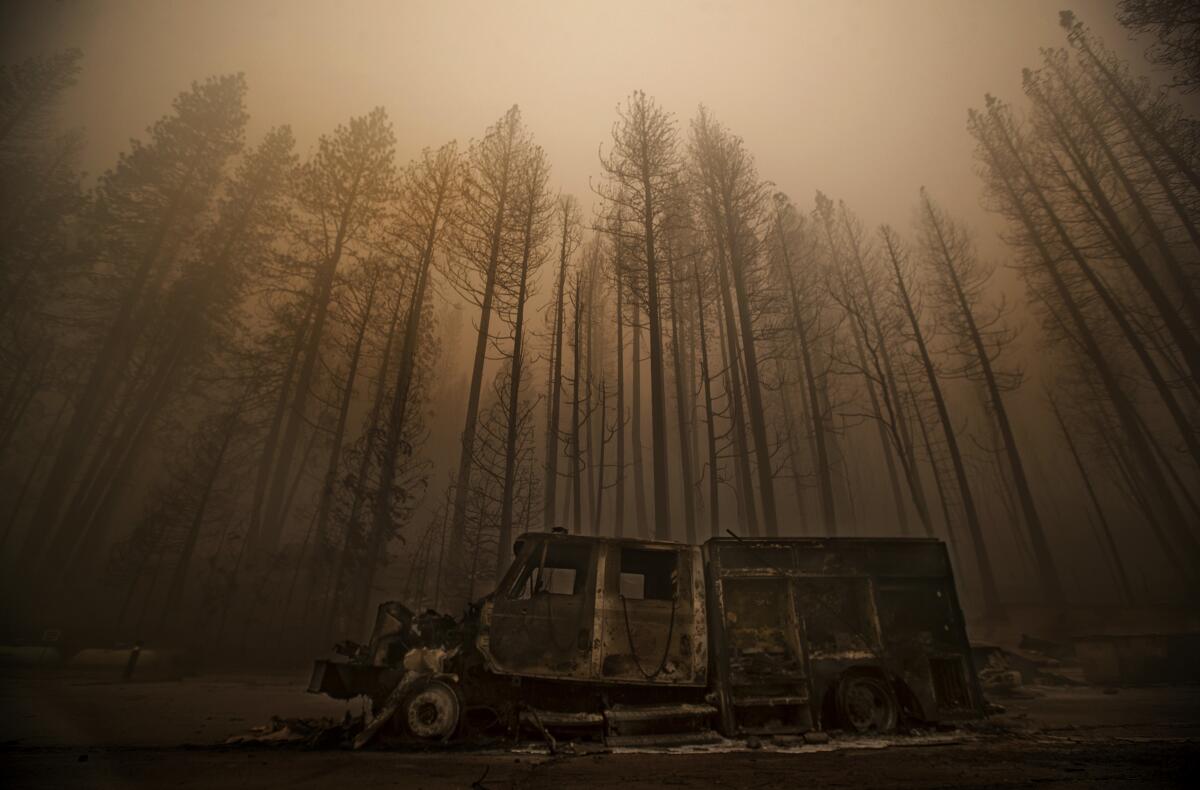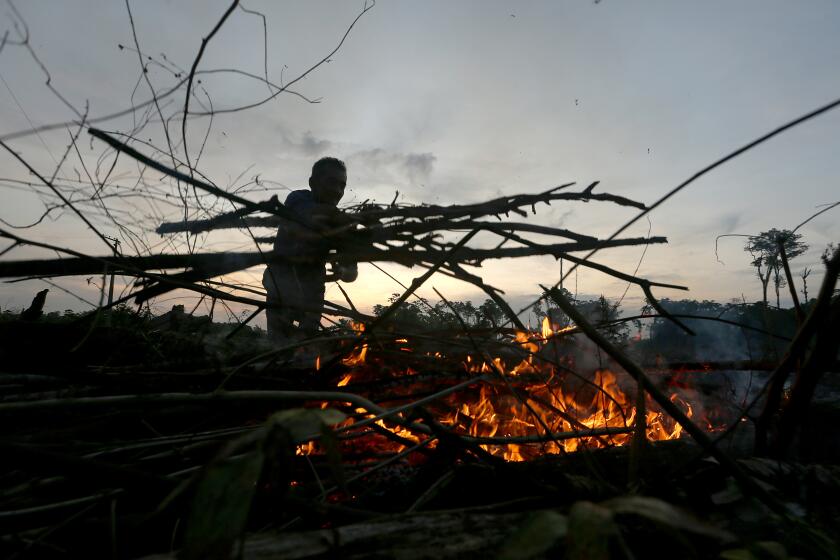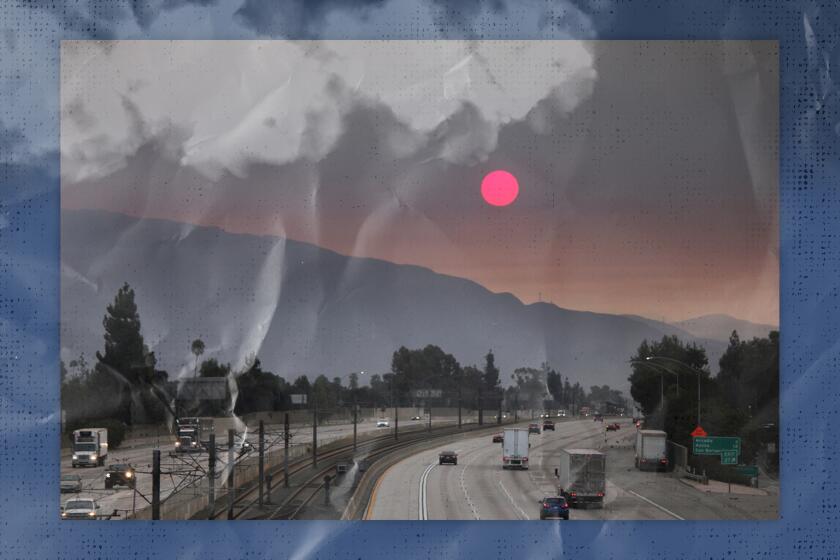Can humanity rise to the challenge in Glasgow and take some meaningful steps on climate change?

- Share via
With just days remaining before next week’s global climate conference in Glasgow, Scotland, the Biden administration released a series of reports from the departments of Defense, Treasury and Homeland Security laying out what the world ought to expect in the years ahead as its atmosphere warms and changes.
Food shortages. Heightened competition for minerals, resources and access to water. Internal strife in developing countries; conflict between nations; collapsed economies and a “threat to the financial stability of the United States.” The displacement of tens of millions of people, leading to mass migrations.
Heads of state, environmental activists, business leaders and journalists are in Scotland for a climate summit that comes as world leaders are running out of time to break away from fossil fuels and prevent the most catastrophic effects of global warming.
This is cataclysmic, dystopian stuff. Like “Dune”! Like “Game of Thrones”! And it is not far, far away in some distant, unhappy future that none of us will live to see. In fact, there have been 18 climate “disaster events” already this year that have cost more than $1 billion each. Climate-related migration has already begun. The last 10 years were the hottest in recorded history.
The first stage of the crisis is here. Yet people don’t seem too terribly concerned. More than three decades after the perils of climate change became well known to the public, and now even as nearly 200 nations gather in Glasgow to plot a last-gasp response, the issue is, frankly, not really top of mind for most of us.
Not that people don’t care at all. They just don’t care in rational proportion to the enormity of the problem. They compartmentalize it or ignore it. They feel impotent to respond. They’re inured.
Even as I type these words, they feel finger-waggy, hysterical, familiar — as if I’m pacing on a street corner with an “end of the world is nigh” sandwich board while normal people walk delicately around me.
But really, nothing else matters this much.
In today’s United States, the obstacles to action come not just from fanatical anti-science ideologues (like, say, Republican Sen. James M. Inhofe of Oklahoma, who once sought to disprove climate change by brandishing a snowball on the floor of the U.S. Senate), and not just from oil and gas executives with Snidely Whiplash mustaches determined to protect their profits at any cost. The problem, at this point, is with all of us who go blithely about our business, pretending life is normal.
United Nations Secretary-General António Guterres has stated flatly that the world is “racing toward the threshold of catastrophe” and facing “a code-red for humanity.”
Can we just brush aside such assertions as misinformation or hyperbole from liberal crybabies and scaredy-cat climate nerds? Not when we’re hearing it from the Intergovernmental Panel on Climate Change, from U.N. leaders, from the world’s top scientists and now from the Pentagon, the intelligence agencies, the National Security Council and others.
This summer we got our most dire warning yet from the IPCC: Expect more raging storms, devastating heat waves, harrowing floods, out-of-control fires, severe droughts and other “extreme events unprecedented in the observational record,” the report said. It is no longer possible to reverse some of the effects of climate change or to stop their intensification over the next three decades.
That was front page news for a day or two. Then it went away.
The Biden administration, bless its dear little heart, says that now, things are going to be different. The largely unfulfilled promises of Rio, Kyoto, Copenhagen and Paris are behind us. We’re now placing climate concerns at the center of the American policy agenda. President Biden has said his goal is to achieve a dramatic 50% to 52% reduction in U.S. greenhouse gas emissions from 2005 levels by 2030.
I have no doubt he’s sincere. And I certainly hope he succeeds.
But last I read, the administration can’t even get the Democrats, much less the fossil-fuel-addicted Republicans, behind its climate agenda. Sure, Donald “climate change is a hoax” Trump has been sent packing for the moment. But Sen. Joe Manchin III (D-W.Va.) — who sometimes seems more powerful than the president and congressional leaders combined — is doing what he can on behalf of his coal-industry compadres at home to obstruct key portions of Biden’s anti-emissions agenda. (On Wednesday, the administration was still fighting valiantly to keep hundreds of billions of dollars for climate programs in its spending bill.)
Besides, the Democrats could lose control in 2022 of the House or Senate, or, two years later, the White House.
I’m sorry to go on like this, but the simple fact is that the United States, China and much of the developed world have so far failed to respond to this crisis adequately.
Hundreds of scientists, writers and academics from 30 countries are demanding that we acknowledge that widespread social collapse is “a credible scenario this century.”
The voluntary pledges to reduce carbon emissions made in Paris in 2015 by nearly 200 countries haven’t been met.
Some countries have recently beefed up their pledges — but even their newly proposed emissions cuts would provide only about one-seventh of what’s needed in the next 10 years to hold global warming to 1.5 degrees Celsius above preindustrial levels, the apparently illusory ideal goal of the 2015 Paris accord.
As for the pledge to provide $100 billion a year by 2020 to help developing nations address climate change, well, the advanced economies are falling well behind on that too.
My point, however, is not that all is lost. On the contrary, I want to add my voice to those clamoring for a more serious and sober response.
According to a recent Pew Research Center study, 72% of people in 17 advanced economies say they’re concerned climate change will harm them during their lives, and 80% say they’re willing to change how they live and work to help reduce its effects. That’s a start.
Sharp, meaningful cuts in emissions beginning right now could still make an enormous difference in what lies ahead.
Can we do that? Can we sacrifice today to protect humanity’s future? I’m not sure.
But perhaps Glasgow can be where it begins.
More to Read
A cure for the common opinion
Get thought-provoking perspectives with our weekly newsletter.
You may occasionally receive promotional content from the Los Angeles Times.












